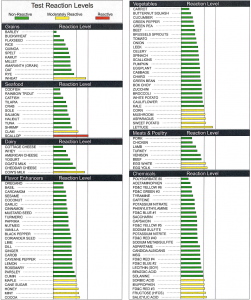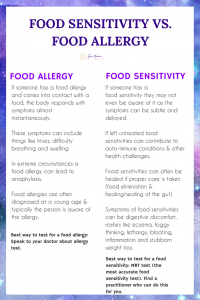The Difference Between Food Allergies And Food Sensitivities
As an online personal trainer and nutrition coach who is working towards two certifications in holistic nutrition, I make it a point to educate my clients on how to pay attention to the signs their bodies give them. And truth is - one of the most common area that people notice signs something is off is with digestion.Believe it or not, in today's world, a common cause of digestive dysfunction for a lot of people has to do with food sensitivities.Perhaps when you hear about food sensitivities you think back to elementary school and the peanut free table - but the truth is a peanut allergy - or any food allergy for that matter - is quite difference than a food sensitivity.AND - the truth is - while many of us are lucky enough to not have classic food allergies - most of us walk around with some type of food sensitivity and don't even realize it !!Food sensitivities can be contributing to health challenges like auto-immune conditions, hormone imbalances and even trouble losing weight!Ready to find out what the difference is between a food allergy and food sensitivity and what you can do to help bring your body back in to balance? Keep reading!
What is a food allergy?
First let's define what a food allergy is. A food allergy is quite literally an immune reaction to food proteins (all foods have protein molecules in them). In this instance the body releases IgE antibodies and the symptoms are felt almost immediately. Symptoms can range from hives, swelling, shortness of breath and can even be life threatening (anaphylactic shock). Usually if someone has a true food allergy, they are aware of it and have been aware since they were young.
What is a food sensitivity?
A food sensitivity is different than a food allergy and you may or may not be aware if you have specific food sensitivities.Typically, when there is a food sensitivity there is likely also some sort of gut issue that needs addressing.Digestion is a complex process, and between the daily stressors of life and the sneaky ingredients that food manufacturer's put into our food - it's no surprise that many people experience gut dysfunction symptoms like gas, bloating, irregularity, lethargy etc.For many people, food sensitivities arise from a condition called leaky gut. Leaky gut occurs from sub-optimal digestion, perhaps due to lack of stomach acid, eating too quickly, bacteria overgrowth, parasites, a poor diet, vitamin deficiencies etc. What starts to happen is that the mucosal lining of the intestine breaks down and becomes permeable. Once the lining is permeable, food particles pass into the blood stream (where they aren't supposed to be) and the body starts to attack food particles because it believes that the particles are foreign invaders. This is a common way that food sensitivities develop.Symptoms of food sensitivities can be lethargy, skin rashes (eczema), bloating, gas, constipation, auto-immune conditions, and weight retention.It is possible that with the proper elimination diet and a heal & seal protocol for the gut, a food sensitivity can heal. But it is important to address the food sensitivity as soon as possible so that further sensitivities do not develop and so that further health challenges do not develop.Food sensitivities are a little trickier to pinpoint since the symptoms are not always loud and clear, but there are a could of ways you can pinpoint the culprits.

Healing & Sealing the Gut
It's one thing to address food sensitivities and do an elimination diet, but it's another thing to actually heal and repair the gut. remember, in the case of food sensitivities it's likely that the lining of the intestine has become permeable so it may need a little TLC.In this case - you may want to consider doing a heal & seal protocol and adding things like a digestive enzyme, a probiotic, collagen, bone broth and glutathione to your routine. Please check with your health care practitioner before adding in any supplementation or changing your diet.Do you have a known food allergy? A food sensitivity? Did you know the difference between the two? Share with me in the comments below!

